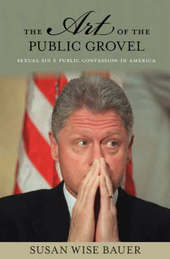
|
The Art of the Public Grovel: Sexual Sin and Public Confession in America
Hardback
Main Details
| Title |
The Art of the Public Grovel: Sexual Sin and Public Confession in America
|
| Authors and Contributors |
By (author) Susan Wise Bauer
|
| Physical Properties |
| Format:Hardback | | Pages:352 | | Dimensions(mm): Height 235,Width 152 |
|
| Category/Genre | Ethics and moral philosophy |
|---|
| ISBN/Barcode |
9780691138107
|
| Classifications | Dewey:176 |
|---|
| Audience | | Tertiary Education (US: College) | | Professional & Vocational | |
|---|
| Illustrations |
10 halftones.
|
|
Publishing Details |
| Publisher |
Princeton University Press
|
| Imprint |
Princeton University Press
|
| Publication Date |
7 September 2008 |
| Publication Country |
United States
|
Description
Presents the history of public confession in modern America. This book explains why and how a type of confession that first arose among nineteenth-century evangelicals has become the required form for any successful public admission of wrongdoing - even when the wrongdoer has no connection with evangelicalism and the context is thoroughly secular.
Author Biography
Susan Wise Bauer is the author of "The History of the Ancient World" (Norton), the first part of a four-volume history of the world. Her other books include "The Well-Trained Mind" and "The Well-Educated Mind" (both Norton). She holds a PhD in American studies from the College of William & Mary.
ReviewsHonorable Mention for the 2008 PROSE Award in Media and Cultural Studies, Association of American Publishers "[A] very entertaining book. Reading this book is like putting the noses of these famous men ... in the mud all over again. Bauer's book, however, is more than a seminar in how to cringe with dignity. It is a lesson in how religious rituals, no matter how old they are, never die. Bauer is a skilled analyst of political rhetoric. She is also a terrific writer."--Stephen H. Webb, Christianity Today "[E]legant in its simplicity and surprisingly persuasive."--Susan Bordo, Chronicle Review "[A]n engaging, sophisticated and wholly persuasive account of how some public figures get away with transgressions and some do not. And the thread linking all of them is the practice of religion. [Bauer's] accompanying texts of successful and failed confessions complete an elegant study, also useful for any aspiring public figure."--Jurek Martin, Financial Times "Why do some public figures get away with sexual transgressions while others do not? This is the central question posed in Bauer's important and informative book... [A] fascinating book that is at once entertaining and thought-provoking. As a seminar in how to cringe with dignity, this book should be required reading for all public figures--and those who aspire to be."--Choice "[T]his exhaustively researched book offers a fascinating trip through more than a century of America's top sex scandals."--Karen Holt, Barnes & Noble Review "As a bonus, Bauer append the texts of statements by six confessors. Connoisseurs of venial sin will want to compare and contrast."--James Boylan, Columbia Journalism Review "Bauer's gallery of scoundrels is ... worth a lingering visit. And the book includes as an appendix a handy collection of the confessions and apologies of Kennedy, Carter, Bakker, Swaggart, Clinton, and Law. For this alone, I intend to keep my copy on the shelf beside my hardbound edition of The Confidence Man."--Peter W. Wood, American Conservative "People interested in the reasons why confession is different than apology, and how to tell the difference the next time a Senator is caught in a men's room with a 'wide stance' will enjoy this humorous and fascinating book. Wannabe politicians and public figures should keep a copy for reference on hand for the almost inevitable slip up."--Sacramento Book Review "Wise Bauer's analysis and background make for lively reading. As readers go along with her, they learn something about both rhetoric and democracy itself... Besides its study of rhetoric and cultural trends, Wise Bauer's book also supplies a rather hilarious review of past scandals and shenanigans. Members of First Secular Humanist will enjoy these."--Tom McBride, Common Review "[A] canny analysis of American political symbolism."--Laura Miller, Salon.com
|